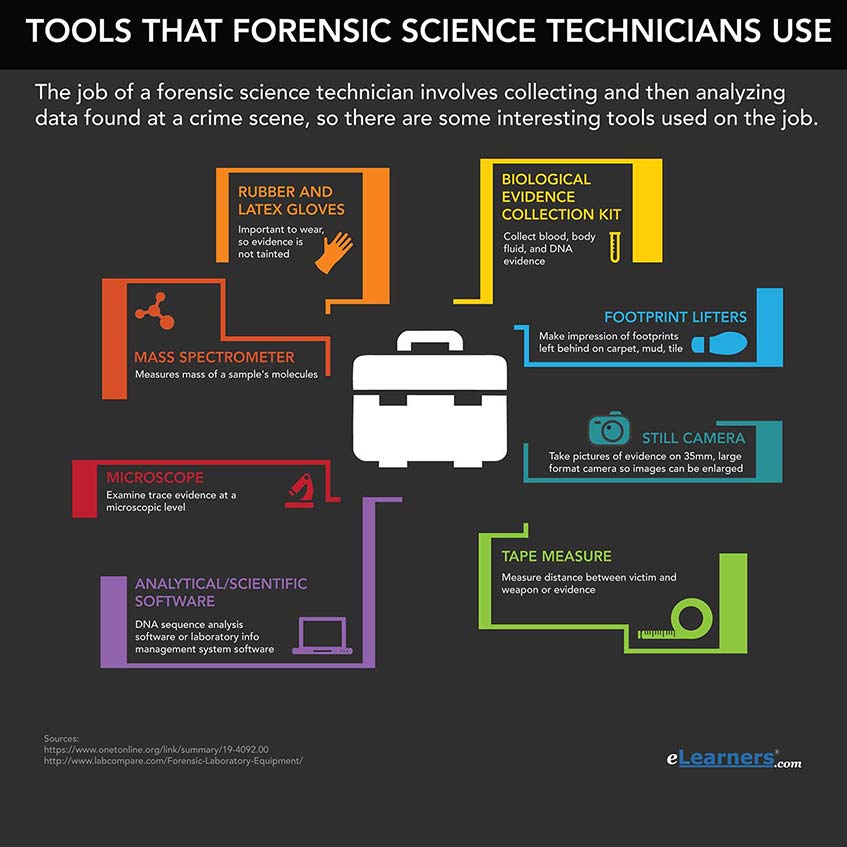What Is a Forensic Science Technician?
Watch any courtroom drama on television, and you’ll hear the word “forensic” used frequently to describe a type of evidence used against criminals. But the question of ‘what is a forensic science technician’ is not always clarified by the time the credits roll on the TV show.[i]

Forensic science technicians are professionals who investigate scientific evidence connected to a criminal occurrence and analyze their finding in hopes of proving guilt or innocence by scientific facts. A forensic science technician works mostly in a lab and keeps full-time hours, and also may visit crime scenes within the jurisdiction of the law enforcement branch for which she or he is employed. (Continue below)
How to Become a Forensic Science Technician
According to the Bureau of Labor Statistics, forensic science technicians typically enter the field with a bachelor’s degree in natural sciences, such as chemistry or biology, and those who are studying forensic science should make sure to take courses that include instruction on forensic science topics, such as human anatomy and toxicology. It is common for a forensic science technician to have earned a bachelor’s degree in natural sciences and then go on to earn a master’s degree in forensic science, perhaps while working in the field already. While certification/licensure isn't typically required to enter the field of forensic science, there are various licenses and certifications that may contribute to a forensic science technician's professional development.[ii]
Some of the skills that forensic science technicians working in the profession have cited as being used on the job are using scientific methods and rules to solve problems, effectively communicating scientific findings in written reports, and using critical thinking. These criminal justice professionals also need to have attention to detail and employ knowledge of chemistry, engineering and technology, and law and government.[iii]
Forensic Science Technician Salary
Now that you know what it takes to pursue this career path, you may be wondering what sort of forensic science technician salary can be possible in the field. While the salary will vary based on where the technician is employed, here is some recent employment data collected:
- Median annual salary for 2013: $54,360[iii]
- Forensic Science Technicians employed in American in 2012: 13,000[iii]
- Projected job growth from 2012-2022: 3% to 7%[iii]
- Projected job openings from 2012-2022: 5,800[iii]
Just as with any profession, there may be several different industries that employ forensic science technicians. The industries that have the highest levels of employment for this profession in 2013 were[iv]:
- Local Government (OES Designation): 7,690 employed
- State Government (OES Designation): 4,210 employed
- Medical and Diagnostic Laboratories: 500 employed
- Scientific Research and Development Services: 170 employed
- Management, Scientific, and Technical Consulting Services: 150 employed
As of 2013, the states with the highest employment level in this occupation were[iv]:
- California: 1,990 employed
- Florida: 1,470 employed
- Texas: 990 employed
- Arizona: 870 employed
- Maryland: 660 employed
If you’re passionate about science and having a place in the criminal justice system, then a forensic science technician career path may be perfect for you. By pursuing graduation from a forensic science degree program, you can combine the scientific knowledge you learn with your analytical skills to bring criminals to justice.
[i] bls.gov/ooh/life-physical-and-social-science/forensic-science-technicians.htm | [ii] bls.gov/ooh/life-physical-and-social-science/forensic-science-technicians.htm#tab-4 | [iii] onetonline.org/link/summary/19-4092.00#Education | [iv] bls.gov/oes/current/oes194092.htm
